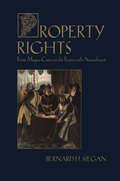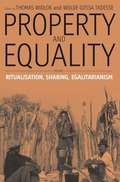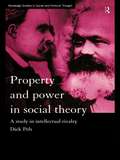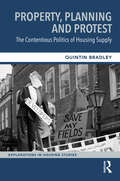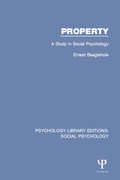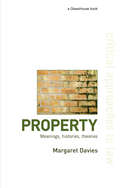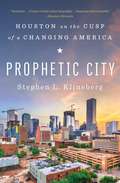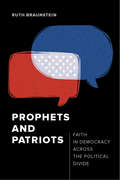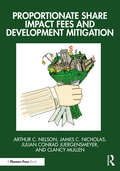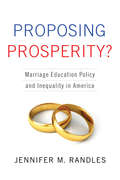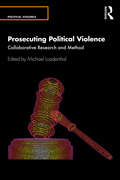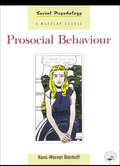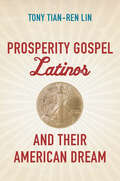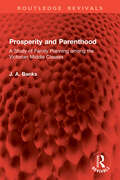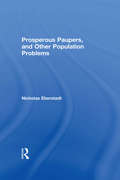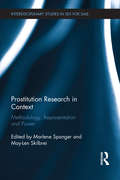- Table View
- List View
Property Rights: From Magna Carta to the Fourteenth Amendment
by Bernard SieganProperty Rights: From Magna Carta to the Fourteenth Amendment breaks new ground in our understanding of the genesis of property rights in the United States. According to the standard interpretation, echoed by as lofty an authority as Supreme Court Justice Harry Blackmun, the courts did little in the way of protecting property rights in the early years of our nation. Not only does Siegan find this accepted teaching erroneous, but he finds post-Colonial jurisprudence to be firmly rooted in English common law and the writings of its most revered interpreters. Siegan conducts an exhaustive examination of property rights cases decided by state courts between the time of the ratification of the U.S. Constitution in 1788 and the adoption of the Fourteenth Amendment in 1868. This inventory, which in its sweep captures scores of cases overlooked by previous commentators on the history of property rights, reveals that the protection of these rights is neither a relatively new phenomenon nor a heritage with precarious pedigree. These court cases, as well as early state constitutions, consistently and repeatedly embraced key elements of a property rights jurisprudence, such as protection of the privileges and immunities of citizens, due process of law, equal protection under the law, and prohibitions on the taking of property without just compensation. Case law provides overwhelming evidence that the American legal system, from its inception, has held property rights and their protection in the highest regard.The American Revolution, Siegan reminds us, was fought largely to affirm and protect private property rights-that is, to uphold the "rights of Englishmen"-even if it meant that the colonists would cease being Englishmen. John Locke and other great theoreticians of property rights understood their importance, not only to individuals who happened to possess property, but to the preservation of a free society and to the prosperity of its inhabitants. Siegan's contribution to this venerable tradition lies in his faithful reconstruction of our legal history, which allows us to see just how central property rights have been to the American experiment in liberty-from the very beginning.
Property and Equality, Volume 1: Ritualisation, Sharing, Egalitarianism
by Thomas Widlok Wolde Gossa TadesseThe ethnography of egalitarian social systems was first met with sheer disbelief. Today it is still hotly debated in a number of fields and has gained sophistication as well as momentum. This collection of essays on "property and equality" acknowledges this diversification by presenting research results in two complementary volumes. They bring together a wide range of authoritative researchers most of whom have worked with hunter-gatherer groups. These two volumes cover existing ethnographic and theoretical ground while maintaining a clear focus on the relation between property and equality. The book consists of the most recent work of prominent members of the original group of researchers in hunter-gatherer studies among them James Woodburn and Richard Lee, and very recent ethnography on hunter-gatherers and other egalitarian systems.
Property and Power in Social Theory: A Study in Intellectual Rivalry (Routledge Studies in Social and Political Thought #No.15)
by Dick PelsProperty and power perform a key role in social and political theories of class inequality and social stratification, however, theorists have yet clearly to define these concepts, their mutual boundaries and scopes of application. This book answers the property/power puzzle by undertaking a broad historical inquiry into its intellectual origins and present-day effects through a series of case studies, including:Marxism vs. anarchism* the fascist assertion of the primacy of the political* social science as power theory* the managerial revolution* the knowledge society and the new intellectual classes
Property, Family and the Irish Welfare State
by Michelle NorrisThis book examines the long-term development of the Irish welfare state since the late 19th Century. It contests the consensus view that Ireland, like other Anglophone countries, has historically operated a liberal welfare regime which forces households to rely mainly on the market to maintain their standard of living. Drawing on case studies and key statistical data, this book argues that the Irish welfare state developed differently from most other Western European countries until recent decades. Norris' original line of argument makes the case that Ireland's regime was distinctive in terms of both focus and purpose in that Ireland's welfare state was shaped by the power of small farmers and moral teaching and intended to support a rural, agrarian and familist social order rather than an urban working class and industrialised economy. A well-researched and methodical study, this book will be of great interest to scholars of social policy, sociology, and Irish history.
Property, Place and Piracy (Routledge Complex Real Property Rights Series)
by Martin Fredriksson James ArvanitakisThis book takes the concept of piracy as a starting point to discuss the instability of property as a social construction and how this is spatially situated. Piracy is understood as acts and practices that emerge in zones where the construction and definition of property is ambiguous. Media piracy is a frequently used example where file-sharers and copyright holders argue whether culture and information is a common resource to be freely shared or property to be protected. This book highlights that this is not a dilemma unique to immaterial resources: concepts such as property, ownership and the rights of use are just as diffuse when it comes to spatial resources such as land, water, air or urban space. By structuring the book around this heterogeneous understanding of piracy as an analytical perspective, the editors and contributors advance a trans-disciplinary and multi-theoretical approach to place and property. In doing so, the book moves from theoretical discussions on commons and property to empirical cases concerning access to and appropriation of land, natural and cultural resources. The chapters cover areas such as maritime piracy, the philosophical and legal foundations of property rights, mining and land rights, biopiracy and traditional knowledge, indigenous rights, colonization of space, military expansionism and the enclosure of urban space. This book is essential reading for a variety of disciplines including indigenous studies, cultural studies, geography, political economy, law, environmental studies and all readers concerned with piracy and the ambiguity of property.
Property, Planning and Protest: The Contentious Politics of Housing Supply (Explorations in Housing Studies)
by Quintin BradleyThe struggle for the right to housing is a battle over property rights and land use. For housing to be provided as a human need, land must be recognised as a common right. Property, Planning and Protest is a compelling new investigation into public opposition to housing and real estate development. Its innovative materialist approach is grounded in the political economy of land value, and it recognises the conflict between communities and real estate capital as a struggle over land and property rights. Property, Planning and Protest is about a social movement struggling for democratic representation in land-use decisions. The amenity groups it describes champion a democratic plan-led system that allocates land for social and environmental goals. Situating this movement in a history of land reform and common rights, this book sets out a persuasive new vision of democratic planning and affordable housing for all.
Property: A Study in Social Psychology (Psychology Library Editions: Social Psychology)
by Ernest BeagleholeFirst published in 1931, this book represents an attempt to study the psychological basis of the institution of property. There had been many psychological and social studies of marriage and religion prior to publication of this title but none which considered the problems which arise when the institution of property is viewed from the angle of social psychology. Some of these problems are set out in the first chapter. In the remaining chapters the author discusses the problems in the light of evidence drawn from the various branches of psychology and sociology of the day. The final chapter indicates the importance of the author’s conclusions for political and social theory at the time.
Property: Meanings, Histories, Theories (Critical Approaches to Law)
by Margaret DaviesThis critique of property examines its classical conception: addressing its ontology and history, as well as considering its symbolic aspects and connection to social relations of power. It is organized around three themes: the ways in which concepts of property are symbolically and practically connected to relations of power the 'objects' of property in changing contexts of materialism challenges to the Western idea of property posed by colonial and post-colonial contexts, such as the disempowerment through property of whole cultures, the justifications for colonial expansion and bio piracy. Dealing with the symbolism of property, its history, traditional philosophical accounts and cultural difference, Margaret Davis has written an invaluable volume for all law students interested in property law.
Prophetic City: Houston on the Cusp of a Changing America
by Stephen L. KlinebergSociologist Stephen Klineberg presents fascinating and groundbreaking research that shows how the city of Houston has emerged as a microcosm for America&’s future—based on an unprecedented thirty-eight-year study of its changing economic, demographic, and cultural landscapes.Houston, Texas, long thought of as a traditionally blue-collar black/white southern city, has transformed into one of the most ethnically and culturally diverse metro areas in the nation, surpassing even New York by some measures. With a diversifying economy and large numbers of both highly-skilled technical jobs in engineering and medicine and low-skilled minimum-wage jobs in construction, restaurant work, and personal services, Houston has become a magnet for the new divergent streams of immigration that are transforming America in the 21st century. And thanks to an annual systematic survey conducted over the past thirty-eight years, the ongoing changes in attitudes, beliefs, and life experiences have been measured and studied, creating a compelling data-driven map of the challenges and opportunities that are facing Houston and the rest of the country. In Prophetic City, we&’ll meet some of the new Americans, including a family who moved to Houston from Mexico in the early 1980s and is still trying to find work that pays more than poverty wages. There&’s a young man born to highly-educated Indian parents in an affluent Houston suburb who grows up to become a doctor in the world&’s largest medical complex, as well as a white man who struggles with being prematurely pushed out of the workforce when his company downsizes. This timely and groundbreaking book tracks the progress of an American city like never before. Houston is at the center of the rapid changes that have redefined the nature of American society itself in the new century. Houston is where, for better or worse, we can see the American future emerging.
Prophets and Patriots: Faith in Democracy across the Political Divide
by Ruth BraunsteinProphets and Patriots takes readers inside two of the most active populist movements of the Obama era and highlights cultural convergences and contradictions at the heart of American political life. In the wake of the Great Recession and amid rising discontent with government responsiveness to ordinary citizens, the book follows participants in two very different groups—a progressive faith-based community organization and a conservative Tea Party group—as they set out to become active and informed citizens, put their faith into action, and hold government accountable. Both groups viewed themselves as the latest in a long line of prophetic voices and patriotic heroes who were carrying forward the promise of the American democratic project. Yet the ways in which each group put this common vision into practice reflected very different understandings of American democracy and citizenship.
Prophets and Protons: New Religious Movements and Science in Late Twentieth-Century America (New and Alternative Religions #4)
by Benjamin E ZellerThis in-depth study shows how new religious movements offer a variety of strategies for reconciling science and religious faith. By the twentieth century, established religious traditions were forced to grappled with the challenges presented by scientific knowledge and innovation. But emerging religions, still led by a living founder to guide them, found news ways to respond to science. The Hare Krishnas, the Unification Church, and Heaven&’s Gate each found distinct ways to incorporate major findings of modern American science, understanding it as central to their wider theological and social agendas. In Prophets and Photons, Benjamin Zeller examines how these New Religious Movements (NRMs) crafted their views on science during their founding period, and how those views evolved over time. These NRMs shed light on how religious groups—new, old, alternative, or mainstream—could respond to the tremendous growth of power and prestige of science in late twentieth-century America. In this engrossing book, Zeller carefully shows that religious groups had several methods of creatively responding to science, and that the often-assumed conflict-based model of &“science vs. religion&” must be replaced by a more nuanced understanding of how religions operate in our modern scientific world.
Proportionate Share Impact Fees and Development Mitigation
by Arthur C. Nelson James C. Nicholas Julian Conrad Juergensmeyer Clancy MullenAfter decades of evolving practice often tested in court, development impact fees have become institutionalized in the American planning and local government finance systems. But, they remain contentious, especially as they continue to evolve. This book is the third in a series of impact fee guidebooks for practitioners, following A Practitioner’s Guide to Development Impact Fees and Impact Fees: Proportionate Share Development Fees. Proportionate Share Impact Fees and Development Mitigation is the culmination of the authors’ careers devoted to pioneering applications of the dual rational nexus test. That test requires (1) establishing the rational nexus between the need for infrastructure, broadly defined, to mitigate the impacts of development and (2) ensuring that development mitigating its infrastructure impacts benefits proportionately. The book elevates professional practice in two ways. First, it shows how the rational nexus test can be applied to all forms of development infrastructure impact mitigation. Second, it establishes the link between professional ethics and equity as applied to proportionate share impact fees and development mitigation. The book is divided into four parts, with the first reviewing policy and legal foundations, the second detailing the planning, calculation, and implementation requirements, the third exploring economic, ethical, and equity implications, and the fourth presenting state-of-the-art case studies. Proportionate Share Impact Fees and Development Mitigation sets new standards for professional practice.
Proposing Prosperity?: Marriage Education Policy and Inequality in America
by Jennifer M Randles"Fragile families"-unmarried parents who struggle emotionally and financially-are one of the primary targets of the Healthy Marriage Initiative, a federal policy that has funded marriage education programs in nearly every state. These programs, which encourage marriage by teaching relationship skills, are predicated on the hope that married couples can provide a more emotionally and financially stable home for their children.Healthy marriage policy promotes a pro-marriage culture in which two-parent married families are considered the healthiest. It also assumes that marriage can be a socioeconomic survival mechanism for low-income families, and an engine of upward mobility.Through interviews with couples and her own observations and participation in marriage education courses, Jennifer M. Randles challenges these assumptions and critically examines the effects of such classes on participants. She takes the reader inside healthy marriage classrooms to reveal how their curricula are reflections of broader issues of culture, gender, governance, and social inequality. In analyzing the implementation of healthy marriage policy, Randles questions whether it should target individual behavior or the social and economic context of that behavior. The most valuable approach, she concludes, will not be grounded in notions of middle-class marriage culture. Instead, it will reflect the fundamental premise that love and commitment thrive most within the context of social and economic opportunity.
Proposing Prosperity?: Marriage Education Policy and Inequality in America
by Jennifer Randles"Fragile families"—unmarried parents who struggle emotionally and financially—are one of the primary targets of the Healthy Marriage Initiative, a federal policy that has funded marriage education programs in nearly every state. These programs, which encourage marriage by teaching relationship skills, are predicated on the hope that married couples can provide a more emotionally and financially stable home for their children. Healthy marriage policy promotes a pro-marriage culture in which two-parent married families are considered the healthiest. It also assumes that marriage can be a socioeconomic survival mechanism for low-income families, and an engine of upward mobility. Through interviews with couples and her own observations and participation in marriage education courses, Jennifer M. Randles challenges these assumptions and critically examines the effects of such classes on participants. She takes the reader inside healthy marriage classrooms to reveal how their curricula are reflections of broader issues of culture, gender, governance, and social inequality. In analyzing the implementation of healthy marriage policy, Randles questions whether it should target individual behavior or the social and economic context of that behavior. The most valuable approach, she concludes, will not be grounded in notions of middle-class marriage culture. Instead, it will reflect the fundamental premise that love and commitment thrive most within the context of social and economic opportunity.
Propuestas del bicentenario: Rutas para un país en desarrollo
by Videnza ConsultoresEn un año decisivo en que conmemora el Bicentenario de la Independencia y se estrena un nuevo gobierno en el Perú, la aparición de este libro resulta de suma importancia para vaanzar hacia el desarrollo que demanda con urgencia el país. Propuestas del Bicentenario propone un conjunto de reformas orien Stadas a fortalecer la institucionalidad y alcanzar el bienestar de todos los ciudadanos. Diseñadas por un equipo de especialistas, bajo la conducción de Videnza Consultores, las propuestas comprenden ocho ejes: reactivación económica; empleo, formalización y protección social; gestión sostenible de los recursos naturales; gestión sostenible de los recursos naturales; gestión pública para mejores servicios; salud desde la prevención y los cuidados médicos cercanos; educación para la empleabilidad; agua y saneamiento de calidad; y reforma fiscal para la estabilidad macroeconómica. Con la convicción de que es posible aplicar políticas eficientes y sostenidas en las agendas de Estado, este libro busca contribuir a sentar las bases de una sociedad más justa, próspera, cohesionada y moderna. Los autores de esta publicación son Luis Miguel Castilla, Janice Seinfeld, Milton von Hesse; Nicolás Besich, Miguel Jaramillo, Roxana Barrantes, Carlos Oliva y Daniel Alfaro
Prosecuting Political Violence: Collaborative Research and Method (Political Violence)
by Michael LoadenthalThis volume unpacks the multidimensional realities of political violence, and how these crimes are dealt with throughout the US judicial system, using a mixed methods approach. The work seeks to challenge the often-noted problems with mainstream terrorism research, namely an overreliance on secondary sources, a scarcity of data-driven analyses, and a tendency for authors not to work collaboratively. This volume inverts these challenges, situating itself within primary-source materials, empirically studied through collaborative, inter-generational (statistical) analysis. Through a focused exploration of how these crimes are influenced by gender, ethnicity, ideology, tactical choice, geography, and citizenship, the chapters offered here represent scholarship from a pool of more than sixty authors. Utilizing a variety of quantitative and qualitative methods, including regression and other forms of statistical analysis, Grounded Theory, Qualitative Comparative Analysis, Corpus Linguistics, and Discourse Analysis, the researchers in this book explore not only the subject of political violence and the law but also the craft of research. In bringing together these emerging voices, this volume seeks to challenge expertism, while privileging the empirical. This book will be of much interest to students of terrorism and political violence, criminology, and US politics.
Prosocial Behaviour
by Hans-Werner BierhoffHow can social bonds in society be strengthened? How do we learn and develop prosocial behaviour? This comprehensive textbook provides up-to-date coverage of the social phenomenon of prosocial behaviour, incorporating all the major developments in the fields of developmental and social psychology. The first section identifies different forms of prosocial behaviour, including estimates of prevalence in everyday situations and the controversy between biological and cultural perspectives as explanatory models of prosocial behaviour. The second and third sections focus on learning and development, with emphasis on social learning, responsibility, empathy and guilt. The fourth section explores the prevalence of prosocial behaviour, in particular the situational and personality factors which inhibit urgently needed prosocial behaviour. The final section is devoted to practical applications, such as how to increase the likelihood that people will work as volunteers in community organisations and how to heighten the willingness to offer first aid. This book will be an invaluable resource for both undergraduate and postgraduate students of social psychology and sociology, as well as anyone with an interest in social services and voluntary organisations.
Prospects and Challenges for Caribbean Societies in and Beyond COVID-19
by Talia Esnard Camille Huggins Shelene Gomes Wendell C. Wallace Christine DescartesThis book presents contributions from a multidisciplinary team of researchers who analyzed the impact of the COVID-19 pandemic and prospects for the Caribbean region. This book examines experiences, and responses to the pandemic in the region as well as some of the lessons that can be leveraged on beyond the pandemic. The volume is organized into four parts. Part I offers perspectives on the structural factors that influenced the Caribbean's experience with the COVID-19 pandemic. Part II delves into the social and psychological dimensions of the pandemic's impact in the region, offering specific examples. Part III explores the ramifications of the pandemic on crime and violence. And Part IV is dedicated to analyzing the regional and national responses to the pandemic. Prospects and Challenges for Caribbean Societies in and beyond COVID-19 will be of interest to researchers in a wide range of disciplines within the Social and Behavioral Sciences interested in studies about the Caribbean. It also aims to serve as a source of information and inspiration for researchers, practitioners and decision makers interested in contributing to the development of the Caribbean region.
Prospects for Professional Engineering Education in the Asia-Pacific Region: A Historical Case Study of the University of Tasmania (Education in the Asia-Pacific Region: Issues, Concerns and Prospects #74)
by Peter Edward DoeThis book examines professional engineering education in the Asia-Pacific region in the context of the history of the Faculty of Engineering at the University of Tasmania. It chronicles the development of professional engineering education at the University of Tasmania following the establishment of schools/faculties of engineering in Australia and New Zealand in the late 1890’s. For its 100th anniversary celebration, former graduates of the university were invited to contribute a written or oral ‘pitch’ on their experience as undergraduates and their subsequent careers a engineers, managers, and leaders. Their stories, reproduced in this book, show a deep appreciation of their time as students. Their careers are a testament to their training. In the second decade of the 21st century, the style of learning and teaching at universities changed dramatically. First, there was the change to student-centered teaching, then followed the move to online delivery which was consolidated through COVID-19. Constructive alignment followed with delivered material aligned to Intended Learning Outcomes, assessment tasks and Engineers Australia Stage 1 Competencies for Professional Engineers. Post COVID-19, there has been a slow return to face-to-face teaching. This is a particular challenge for engineering students because of the need for ‘hands on’ experience in laboratories. This book examines the challenges in training engineers for the future and considers the future of professional engineering education.
Prosperity Gospel Latinos and Their American Dream (Where Religion Lives)
by Tony Tian-Ren LinIn this immersive ethnography, Tony Tian-Ren Lin explores the reasons that Latin American immigrants across the United States are increasingly drawn to Prosperity Gospel Pentecostalism, a strand of Protestantism gaining popularity around the world. Lin contends that Latinos embrace Prosperity Gospel, which teaches that believers may achieve both divine salvation and worldly success, because it helps them account for the contradictions of their lives as immigrants. Weaving together his informants' firsthand accounts of their religious experiences and everyday lives, Lin offers poignant insight into how they see their faith transforming them both as individuals and as communities. The theology fuses salvation with material goods so that as these immigrants pursue spiritual rewards they are also, perhaps paradoxically, striving for the American dream. But after all, Lin observes, prosperity is the gospel of the American dream. In this way, while becoming better Prosperity Gospel Pentecostals they are also adopting traditional white American norms. Yet this is not a story of smooth assimilation as most of these immigrants must deal with the immensity of the broader cultural and political resistance to their actually becoming Americans. Rather, Prosperity Gospel Pentecostalism gives Latinos the logic and understanding of themselves as those who belong in this country yet remain perpetual outsiders.
Prosperity and Parenthood: A Study of Family Planning among the Victorian Middle Classes (Routledge Revivals)
by J A BanksFirst Published in 1954, Prosperity and Parenthood is a study of Victorian middle-class ideas about the standard of living, marriage, and the responsibilities of family life. The book begins by tracing the fall in fertility in the 1870s to a change in the middle-class conception of parenthood and goes on to show that the standard of living considerably expanded during the period of great prosperity, roughly 1850 to 1870.The author also gives a detailed study of what the middle classes considered appropriate for a civilized existence and ends by considering the “Great Depression” as a possible factor attacking the actual level of living and making it possible for the middle classes to maintain established standards only by cutting down the size of their families. This is an important historical reference work for students and scholars of sociology, sociology of family, British sociology, social history, and medical sociology.
Prosperous Paupers and Other Population Problems
by Nicholas EberstadtIn current intellectual and public discourse, the entire modern world-from the affluent United States to the poorest low-income regions-is beset today by a broad and alarming array of "population problems." Around the globe, leading scientists, academics, and political figures attribute poverty, hunger, social tension, and even political conflict t
Prostate Cancer, Sexual Health, and Ageing Masculinities: Exploring the Achilles' Heel of Men
by Thomas Johansson Jesper AndreassonThis book provides a rich, multidimensional analysis of how prostate cancer is lived, treated, and perceived by different actors through the stages of care, rehabilitation, and recovery. Furthermore, it focuses on how side effects, such as urinary leakage and impotence, affects the construction of masculinity. Though the book foregrounds men treated for prostate cancer, it also includes the voices of partners and health care professionals, such as urologists, contact nurses, and sexual health counsellors. The focus is on both phenomenological aspects of prostate cancer—how the disease affects men’s self-perception and lifestyle—and on sociological aspects—that is, how gender and masculinity are understood and negotiated in social situations/interactions. Situated within the field of critical studies on men and masculinity the book engages in an intersectional analysis of the relationship between prostate cancer, class, and ageing masculinities, as well as providing an analysis of the complex relational triad created when voices of treated men, their partners, and health care professionals are brought together.
Prosthetic Culture (International Library of Sociology)
by Celia LuryIn a fascinating account of how technology is altering our consciousness, Celia Lury shows how the manipulation of photographic images and ways of seeing can so redefine the relation between consciousness, the body and memory as to create a 'prosthetic culture' whose capacities both extend and threaten our humanity.We live in a society in which some memories can be falsely implanted in the individual while others are stored in video archives of images, in which the powers of cartoon superheroes break through the limitations of time and space. Using the examples of photo-therapy, family albums, Benetton advertising campaigns, the phenomenon of false memory syndrome and the 'lives' of cartoon characters this book argues that the 'eyes' made available by contemporary visual technologies involve not simply specific ways of seeing, but also ways of life.
Prostitution Research in Context: Methodology, Representation and Power (Interdisciplinary Studies in Sex for Sale)
by Marlene Spanger May-Len SkilbreiThe starting point for this book is the question of how we research sex for sale and the implications of the choices we make in terms of epistemology and ethics. Which dilemmas and ethical aspects need to be taken into account when producing qualitative data within a highly politicised and moral-infected realm? These two questions are exactly what Spanger and Skilbrei aim to unpack in this unusual interdisciplinary methodology book, Prostitution Research in Context. The book offers contributions from a number of scholars who, based on their reflections on their own research practice and the existing knowledge field, discuss ongoing methodological issues and challenges representative of international research on sex for sale. Some chapters deal explicitly with methodological dilemmas in research; others thematise the encounter between prostitution research and general texts on epistemology. Other chapters again actively engage with the ethical dilemmas that research on the topic of sex for sale can entail. The authors represent different disciplines, but share an interest in engaging in reflexive research practices informed by feminism and feminist epistemologies. An authoritative contribution to the field, this innovative volume will appeal to international scholars and students from across the social sciences and humanities in areas such as sociology, anthropology, criminology, media studies, feminist studies, human geography and history.
